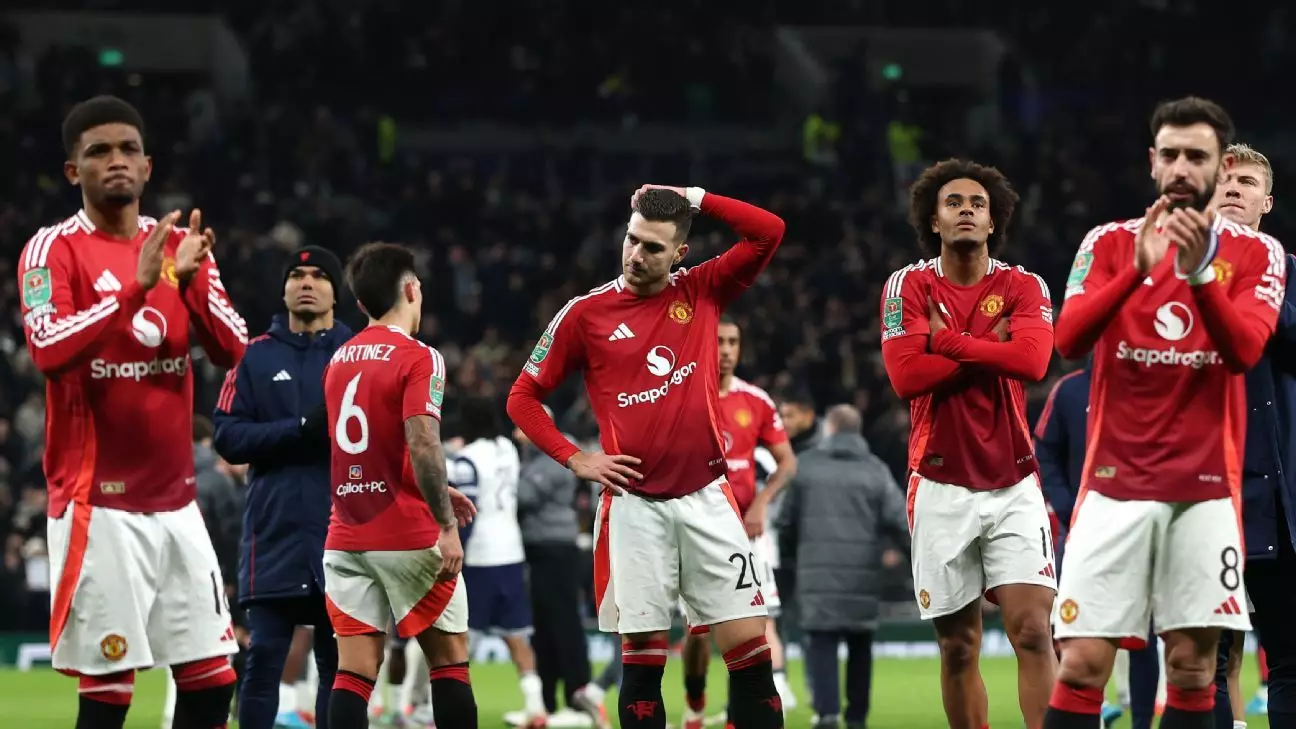In a captivating clash that showcased the unpredictability of football, Tottenham Hotspur edged Manchester United 4-3 to secure a place in the Carabao Cup semifinals. The match at Tottenham Hotspur Stadium was filled with highs and lows, strategic choices and misfortunes that kept fans on the edge of their seats. As the dust settled, it was clear that this encounter was more than just a battle for a trophy; it was a reflection of each club’s current position and future aspirations.
The opening act was marked by Dominic Solanke’s brilliant strike in the 15th minute. His precise finish, sent into the near post, set the stage for what seemed like an uncomplicated evening for Spurs. The subsequent performances from Dejan Kulusevski and Solanke established a substantial 3-0 lead, making it appear as though Tottenham was on a clear path to secure their semifinal spot.
However, the tide of the match shifted dramatically after halftime. United’s manager, Ruben Amorim, made the bold decision to introduce three substitutions, including Joshua Zirkzee, who quickly turned the tide. Zirkzee’s opportunistic goal, stemming from a defensive blunder by Spurs’ goalkeeper Fraser Forster, breathed new life into a United side that had struggled to assert itself in the first half.
As the errors mounted, Forster’s performance spiraled downward. His hesitance and misjudgments opened the floodgates for further United attacks, leading to a stunning seven-minute period where they cut Tottenham’s lead to just one goal. A combination of pressure and lack of composure shifted momentum to the visitors, who clawed back from the brink and placed Spurs on the defensive.
The Critical Chaos
Tottenham’s second-half collapse highlighted significant vulnerabilities within their setup. Forster’s repeated mistakes were alarm bells for a club aiming for stability, and questions arose about how solid the Spurs defense truly is. This chaos not only unraveled the team’s earlier confidence but also exposed the cracks in their strategy, prompting fans and analysts alike to reconsider the implications of Postecoglou’s attacking philosophy.
Despite the intense pressure, Spurs managed to regain their composure toward the game’s end. In a thrilling bout of late drama, Tottenham’s captain, Son Heung-min, took advantage of United’s goalkeeper Altay Bayindir’s clumsy attempt to deal with a corner kick, restoring Spurs’ two-goal cushion.
The clash also invoked discussions about tactical management. United controlled much of the first half but failed to convert their dominance into goals. The lack of urgency in the final third, coupled with individual mistakes, reinforced the critique of the squad’s depth and scoring capability. Amorim’s realization post-match was clear: while they showed resilience in fighting back, the need to tighten defensive coordination is paramount.
Contrastingly, Spurs’ ambition to build a competitive unit under Postecoglou continues, albeit amid growing scrutiny. Crowds displayed discontent towards club chairman Daniel Levy, voicing their frustration over perceived financial conservatism. The backdrop of this emotional turmoil signifies that the path to regaining fans’ trust will require more than just wins; it necessitates a return to consistent performances across all competitions.
As both teams exited the pitch, individual performances remained under the microscope. Forster’s shaky display may give rise to questions about his position as the interim starter. Meanwhile, United’s Marcus Rashford found himself excluded from squad selection amidst swirling rumors of his discontent at the club. His absence, highlighted by mural slogans from dedicated away fans, epitomizes the mounting pressure on players who do not perform up to expectations.
Despite the thrills and spills of the match, it served as a poignant reminder that victory alone cannot erase internal strife or external criticism. Both clubs face pivotal moments ahead; for Spurs, a shot at silverware could ease tensions, while a cohesive and effective team structure is vital for United to reclaim its place among the elite.
A Step Closer to Redemption
The semi-finals await Tottenham and present a crucial opportunity to end a 16-year trophy drought. This single encounter, riddled with flaws and errors, could become a catalyst for change if properly harnessed. Balancing ambition and reality will be key as both clubs vie for not just a win, but the foundations for sustainable success. With fervent hopes from their fanbases, the upcoming fixtures could define seasons and shape legacies. Football, as we know, is often unkind, but it is equally rich with opportunity for redemption and glory.

